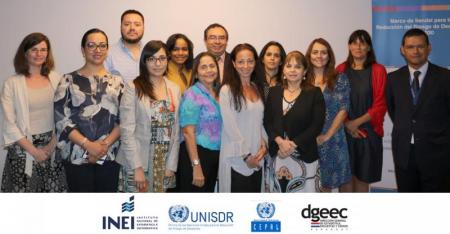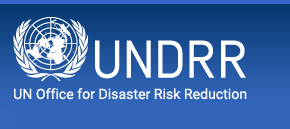- Our Mandate
- Mission and Objectives
- UNDRR in the UN
- Work Programme & Annual Reports
- Results Based System
- Work Partnerships
- Headquarters - Geneva
- SG-UN representatives for DRR
- Regional Office – The Americas and the Caribbean
- Head of the Regional Office – The Americas and the Caribbean
- What is Disaster Risk Reduction?
- What is the International Strategy?
- History of UNDRR
Americas works to improve disaster statistics

By Brigitte Leoni
CARTAGENA, 19 June, 2018- Representatives of eight national institutes of statistics in the Americas continue to meet today in Cartagena, Colombia, to discuss better ways to work together to collect data and statistics to monitor progress on reducing disaster losses as outlined in the Sendai Framework for Disaster Risk Reduction.
The data is essential to monitoring progress against the Sendai Framework's seven targets including reducing mortality, reducing the numbers of people affected by disasters, reducing economic losses and damage to critical infrastructure.
The data is to be uploaded to the online Sendai Framework Monitor launched in March, 2018, and is defined by 38 indicators linked to the seven targets.
"The meeting held in Cartagena before the official opening tomorrow of the sixth Regional Platform for Disaster Risk Reduction in the Americas is the first of its kind to gather national institutes of statistics and will be very important to help countries to establish and refine their disaster national plans," said Raul Salazar, Head of the UN office for Disaster Risk Reduction in Panama.
The informal meeting will identify gaps and challenges that will need to be addressed to achieve the best collaboration between national entities and sectors involved in collecting data to support the Sendai Monitoring Framework.
Among the participants present at the meeting were Ms. Grissell Arias from ONE, the National Office of Statistics in the Dominican Republic; Mr. Christian Cando from INEC, National Institute of Statistics in Ecuador; Ms. Pauline Leonard, Economic Commission for Latin America and the Caribbean (CEPAL); Ms. Patricia Casanova from INE, National Institute of Statistics, Chile; Mr. Peter Abad from INEI, National Institute of Statistics, Peru; Ms Gretel Elena Vidal Medina, Centro de Gestion de la Informaciòn Económica, Social y Medio Ambiental, Cuba; Ms. Jerasela Lopez Aguilar Margarita from the National Institute of Statistics (INEGI), Mexico; Ms. Gladys Matute from the National Institute of Statistics, Nicaragua; and Ms. Elisabeth Barrios from the Dirección General de Estadística, Encuestas y Censos (DGEEC) in Paraguay.
"To be here today is very important for us as Peru has suffered many disasters along its coasts as a result of El Niño phenomenon and there is a need to refine our statistics in order to improve our prevention plans. It is important at national level but also at regional level," said Peter Abad, from the Institute of National Statistics (INIE) in Peru.
Participants highlighted the urgent need for more harmonization between systems and methodologies in the region.
"The work for countries to report on many frameworks to achieve the 2030 Agenda for Sustainable Development is more and more complex and complicated. We need more coherence nationally and regionally to simplify the way we collect data to be able to report accurately and in a timely manner," said Elisabeth Barrios from the National Institute of Statistics in Paraguay.
Follow the UNDRR news online :
 Now we have twitter account @UNDRR Américas y el Caribe
Now we have twitter account @UNDRR Américas y el Caribe
JOIN US!
Tweets por el @UNDRR Américas y el Caribe
